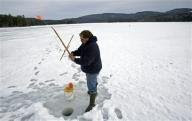Frugal Americans may be heading outside, where the air is fresh and activities inexpensive, even after you add in the cost of Bengay.
Sales of all sectors of sporting goods are holding steady - unlike sales of most everything else - according to preliminary 2008 figures from the National Sporting Goods Association.
Many are opting for fishing, according to a Reuters report, which notes that spending on rods and reels hit an all-time high just as the recession was beginning. (The Reuters story features New Hampshire's Mike MacDonald, pictured to the right, skinning a fish next to an ice hole on frozen Lake Winnipesaukee. "This costs $6 to get a bucket of bait and it will last the whole day," he said. I can confirm, as a N.H. native, that six hours of sub-zero idleness is indeed considered "recreation." )
(The Reuters story features New Hampshire's Mike MacDonald, pictured to the right, skinning a fish next to an ice hole on frozen Lake Winnipesaukee. "This costs $6 to get a bucket of bait and it will last the whole day," he said. I can confirm, as a N.H. native, that six hours of sub-zero idleness is indeed considered "recreation." )
Sales on sporting goods have taken only a slight dip - about 1-2 percent in 2008 - according to Tom Doyle of the National Sporting Goods Association. Doyle tells the Squeeze that participation in recreational sports has remained strong.
"Typically, the industry is more resilient to recession," he says. "Right now, people aren't replacing equipment, but they're still buying things like golf balls and tennis balls."
The recreational golf industry, which showed some weakness late last year, is holding steady in year-over-year figures so far in 2009. Rounds played in the U.S. increased 8.6 percent nationwide in January 2009 from January 20088, according to Golf Datatech. The South Atlantic, which includes the Carolinas, saw a 4.1 percent drop, due in part to unfavorable weather.
Local golf traffic also has slowed, says Larry Benson, chief operating officer of I.R.I. Golf Group, which operates the Carolina Trail's seven Charlotte-area courses.
Benson, however, isn't sure if the slowdown is because of the economy or the harsh winter and early spring we've endured. "It's going to be easier for me to evaluate when we get two weeks of good weather," he says.
Benson has noticed, however, that fewer players are coming in the afternoons, instead opting to play in the early evening, when they can take advantage of cheaper twilight rates. Those later arrivals also might be due to another reason.
"In the old days, everybody would take Wednesday afternoons off to play - and Friday afternoons, too," he said. "I think they're much more serious about job stability now."
Wednesday, April 1, 2009
Downturn upside: Rediscovering Mr. Blue Sky
Subscribe to:
Post Comments (Atom)





0 comments:
Post a Comment